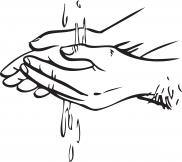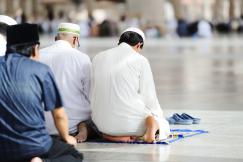
What was most painful about “Auntie F’s” death from COVID-19 last week was that no family member or friend could be with her as she took her last breath.
Auntie F was a pioneer of the Muslim community I grew up in in Canada. She was instrumental in helping establish my city’s first Masjid back in the 1960s. She exemplified not just volunteerism, but so many of the characteristics of a good Muslim: generosity, empathy, compassion, as well as patience and steadfastness in the face of hardship.
Toward the end of her life, she developed an illness that required her to be moved to a nursing home, as her family had done all they could to care for her in her own home. Despite visits from them, as well as the countless friends and community members who loved her, they were all far from her when she died.
Auntie F is not the only one who passed away in this manner. People around the world have been sharing painful stories of not being able to say goodbye in person to loved ones who have died from COVID-19. Not being able to sit with parents, grandparents, aunts, uncles, and children to offer words of comfort and love, or later, to bury them according to chosen rites.
Which is where the death of Muadh ibn Jabal, one of the greatest Companions of Prophet Muhammad, peace and blessings be upon him, comes in.
He was known for his knowledge and intelligence. The Prophet once said, “The most knowledgeable of my Ummah in matters of Halal and Haram is Muadh ibn Jabal.”
Muadh, may Allah be pleased with him, was sent to Yemen by the Prophet himself, and later to Palestine by Omar ibn al Khattab, to teach the Quran and Islam to the new converts among the people there.
While in Palestine, far from family and friends in Madinah, he became sick with an infectious disease. Then, death arrived. This is how he welcomed the inevitable, as described by AbdulWahid Hamid in his book “Companions of the Prophet 2”:
“[...] he turned in the direction of the Kaba and repeated this refrain: ‘Welcome Death, welcome. A visitor has come after a long absence…’
And looking up to heaven, he said:
‘O Lord, You know that I did not desire the world and to prolong my stay in it….O Lord, accept my soul with goodness as You would accept a believing soul…’
He then passed away, far from his family and his clan but among people who loved him, a Dai (preacher) in the service of God and a Muhajir (migrant) in His Path.”
As painful as it is for our loved ones to meet death away from us, it is a prelude to how we will ultimately meet Allah on the Day of Judgement: alone and ready to face accountability for how we lived our lives. This applies to every single one of us, regardless of whether our family surrounded us on our deathbed, or we were alone in a hospital room.
While facing death alone is distressing, we can remember the courage of Muadh (may Allah be pleased with him) in facing it with acceptance and hope.
With Auntie F, when the nurse on duty called her brother as she was taking her last breaths, he was deeply distressed at not being able to be with her. He asked the nurse, who is not Muslim, to help her repeat the Kalimah. The nurse wrote it down and repeated it to her. Auntie F could not speak, but she nodded in agreement as she heard the words, so familiar, the motto of her life. Then she passed away.
May Allah accept those who have died of COVID-19 as martyrs. May He make us ready for death in any state. And may He end this pandemic very soon so that we can once again, be with those we love in their final moments.








Add new comment